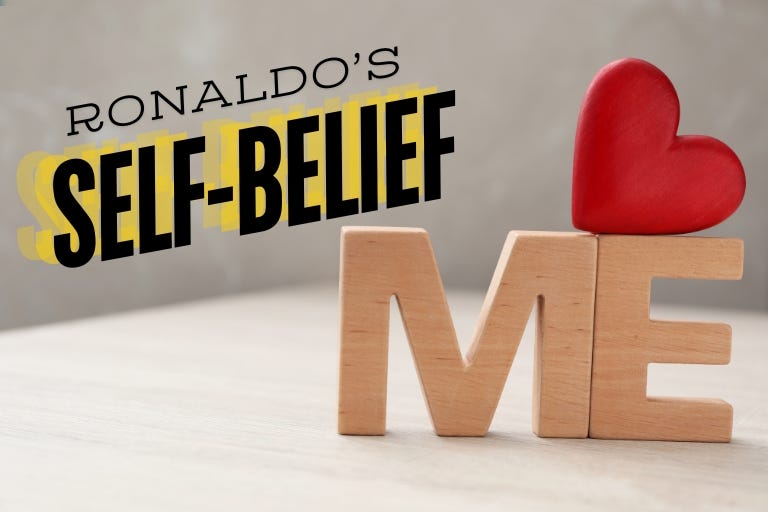What Cristiano Ronaldo's Narcissism Teaches Us About High Performance
He Has Weaponized Self-Belief
Cristiano Ronaldo celebrates goals like he just discovered fire.
Arms spread wide, chest puffed out, that signature "SIIIUU" celebration (whatever that means), that can probably be heard from space.
He poses for photos like he's doing the camera a favor. Talking about himself with the kind of confidence usually reserved for people announcing lottery wins.
Most people watch this and think he's got an ego problem. Which is something of an understatement.
But here's what I believe, they miss: Ronaldo's narcissism isn't a character flaw. It's a performance tool.
The Confidence Construction
Ronaldo has built his self-image like a 10th-century fortress, designed to withstand any attack.
When critics dare to say he's past his prime, he goes out and scores a hat trick. When people doubt his abilities, he breaks another record.
When teammates get more attention, he makes damn sure the next game becomes the Ronaldo show.
Of course, this isn't accidental.
This is someone who has weaponized self-belief.
Most people try to stay humble and modest.
Ronaldo decided that humility is a luxury he can't afford if he wants to perform at the highest level.
Pressure Immunity
Watch Ronaldo take a penalty in a World Cup final and you'll see something interesting.
No nerves.
No hesitation.
Just absolute certainty that the ball is going into the back of the net.
This has been years in the making. Telling himself he's the best player in the world.
When you believe you're exceptional, pressure becomes opportunity instead of a threat.
Most athletes crumble under pressure because they're afraid of failing and proving they're not as good as people think.
Ronaldo doesn't have this problem because he's convinced himself he's better than people think.
His narcissism creates psychological armor against any doubts.
A Motivation Machine
Ronaldo treats every slight, real or imagined, as fuel for his performance fire.
Didn't win the Ballon d'Or?
He'll show them.
A teammate given “man of the match?” He'll score twice next game.
Someone dares to mention he's in decline? I bet he'll extend his career just to prove them wrong.
This is a specific type of ego.
You have to believe every criticism is wrong and every success proves your superiority.
The average person would find this exhausting.
Not Ronaldo, he’s a living, breathing “Mr. Energizer Bunny.”
His Standards Obsession
Ronaldo's narcissism doesn't allow him to accept mediocrity, even from himself.
He trains like he's still fighting for his first professional contract. He maintains his body like a Formula 1 car. He treats friendly matches like they're Champions League finals.
When you think you're the greatest, you can't allow yourself to have off days.
This creates a feedback loop: high standards lead to better performance, which reinforces the belief that you're exceptional, which in turn maintains the high standards.
His Recovery Resilience
When you're convinced you're destined for greatness, temporary failures become minor delays rather than identity threats.
Most people let setbacks damage their confidence. Ronaldo's ego is so robust that setbacks just make him angry, and angry Ronaldo is dangerous.
Attention Strategy
His celebrations, his social media presence, his interviews - they're all designed to keep the spotlight on him.
This isn't vanity, it’s business.
In football, attention translates to endorsements, transfer value, and legacy. Players who perform well but stay quiet often get forgotten. Ronaldo makes sure that will never happen to him
Selective Application
You don't need Ronaldo-level narcissism to benefit from these insights.
You can build robust self-confidence without being insufferable. You can set high standards without needing constant validation. You can use criticism as motivation without taking everything personally.
The key is understanding when confidence serves you and when humility serves you better.
What You And I Can Learn From Ronaldo
Ronaldo's approach works because he's in a field where individual performance is measurable and public.
His context rewards extreme confidence.
But you can apply modified versions of his strategies:
Build evidence for your capabilities instead of hoping others will notice them.
Use setbacks as information rather than identity damage.
Set standards based on what you're capable of, not what others expect.
Most importantly, don't confuse confidence with arrogance.
Confidence is believing in your abilities. Arrogance is needing others to believe in them, too.
Sometimes, the most productive thing you can do is believe in yourself more than the evidence suggests you should.
Just maybe keep the celebrations a little quieter than Ronaldo.



Great post. And very well written as well. This kind of narcissm is not what is usually seen which stems from a lack of self worth. For example, I believe in Trump's case he needs the accolades because without the reinforcement he feels worthless. He can't accept criticism because it cuts him to the bone. I find that very sad for him. I don't approve of his language or behavior and I believe the criticism he receives is valid. But I also feel sad for him.